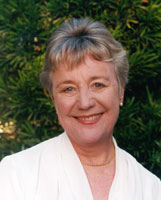|
HOME | SEARCH | ARCHIVE |
|
Prof argues new steps aren’t enough to ensure airline security
![]()
By Patricia McBroom, Public Affairs
| |  Karlene Roberts |
19 September 2001
|
Airline security will not be assured by technology alone. Nor will eliminating curbside check-in and creating long passenger lines at the ticket counters necessarily help, according to a professor in the Haas Business School whose associates are looking hard at the industry in the light of last week’s tragic hijackings. “All the rules by which airlines have been operating must be re-created. We need a total systems approach,” Roberts said. Robert’s theories — and her informal network of experts on and off campus, from the fields of aviation, police work, engineering, psychology and others — are affecting the dialogue on airline security as the country seeks to deal with an unprecedented situation. Two of some 13 people in the network, called the High-Reliability Organizations Group, are currently talking with individual airlines about safety. A third is preparing a report for the FAA that recommends new research parameters. “Highly structured organizations are fine when nothing is going on,” said Roberts. “But in a war, you need a more fluid organization. You have to rely on lower-level people and feel they are well trained. “The system has to be sufficiently malleable so that information can move from one level to the next relatively rapidly.” Applied to the airlines industry, this means that everyone involved, from security guards to baggage scanners, ticket takers, flight crew and others, need to sit down together and ask how they can improve safety while still serving passengers, said Roberts. “You want the people in places where the rubber meets the road to be able to make important decisions,” she said. Roberts said that status differences between pilot and flight attendants should be reduced, adding that the situation is so structured now that she knows of one case where a flight attendant who detected a dangerous problem did not convey this information to the plane's captain. But can security guards, flight attendants and others really be trained to pick out well-educated, well-heeled terrorists like those who hijacked and flew planes into the World Trade Center towers and the Pentagon on Sept. 11th? Yes, some of the time, said Roberts. “They are hard to identify and you never get to 100 percent accuracy, but people intent on killing can be picked out to some extent,” said Roberts. She added that flight crews can be taught how to handle difficult passengers and what action to take when their intuition is suddenly engaged and they feel the hair on the back of their necks standing up. As it is now, she said, such information would probably not even be communicated up the hierarchy. Robert’s experience at making high-risk organizations more reliable includes work with the U.S. Navy’s Aircraft Carrier Aviation program. Currently she has a contract to transform all the refineries of BP-Amoco, the world’s third largest oil company, into high-reliability organizations.
The airlines need to make their entire organizations and the people in them more sensitive and effective in dealing with dangerous situations, particularly in picking out suspicious people, said Karlene Roberts. Her career has focused on creating what she calls “high reliability organizations” in such industries as nuclear power, finance and oil refining, which need a high level of security to prevent disasters.
She believes that measures currently being taken by the Federal Aviation Administration do not address the problems revealed last week. Baggage, for instance, was not involved in the hijacking.
Robert’s approach challenges the received wisdom about needing a command structure to deal with dangerous situations. Instead, she calls for a more fluid, non-hierarchical organization through which information and warning signals can flow unimpeded.
Home | Search | Archive | About | Contact | More News
Copyright 2000, The Regents of the University of California.
Produced and maintained by the Office of Public Affairs at UC Berkeley.
Comments? E-mail berkeleyan@pa.urel.berkeley.edu.